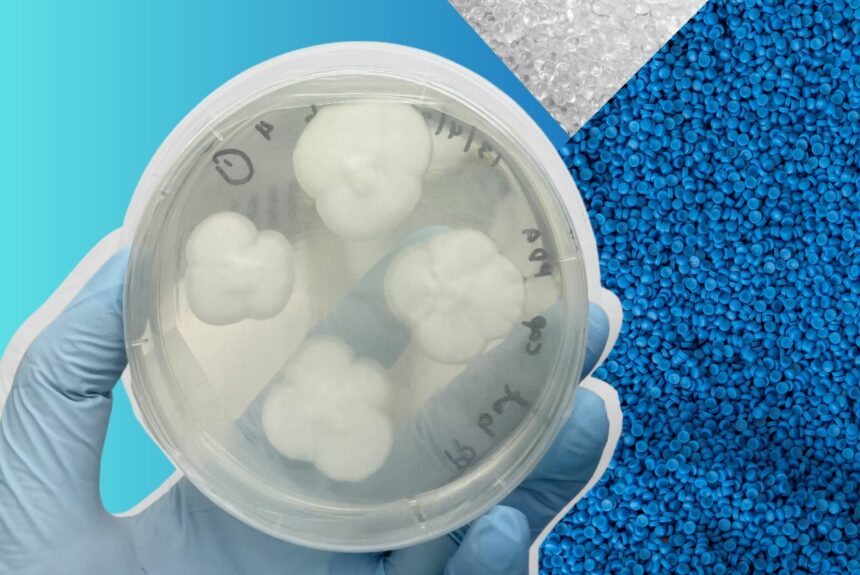Plastics serve many useful applications in our world and in everyday life – from ventilators in hospitals to keeping our food from spoiling. Yet, plastic pollution takes anywhere from 20 to 500 years to decompose, rendering it one of the greatest environmental challenges on the planet. Now, scientists at the University of Sydney have made a potential breakthrough discovery that could offer a solution to the mounting problem of plastic waste.
>>>READ: An Innovative Tech Company is Engineering a Solution to Plastic Waste
In a study published in the science journal npj Materials Degradation, researchers from the University of Sydney discovered that they could use two types of common plant and soil-dwelling fungi, Aspergillus terreus and Engyodontium album, to break down small samples of polypropylene, a widespread commercial plastic that’s used to make everything from diapers to sour cream containers. According to the Australian Broadcasting Corporation (ABC), it took 90 days for the backyard mold to degrade 27% of the plastic tested, and approximately 140 days to fully break it down. The samples were exposed to ultraviolet rays or heat to accelerate the degradation process.
Chemical engineering professor Ali Abbas, who oversaw the experiment, said this was the highest rate of decomposition ever reported in the literature worldwide. Abbas told ABC the findings made him “very confident” that the technology could be scaled up to process thousands of tons of plastic waste a year since the same procedures already exist in other fields.
“It is scaling up which is very much similar to any kind of fermentation process,” he said, before continuing.“That technology already exists for those processes and we’re able to now borrow that learning from chemical process engineering and bring it into this particular process here.”
The decomposition rate of plastic depends on a variety of factors, including how much sunlight exposure a plastic gets and what type of material the plastic is made from. Common plastic waste products like single-use plastic grocery bags take about two decades to decompose, while plastic water bottles sourced from polyethylene terephthalate (PET)–one of the world’s most standard plastics–take about 450 years to fully break down, according to the World Wildlife Fund. Just 5% of plastics in the U.S. are actually repurposed into new products, according to a new report from Greenpeace on the state of recycling in the U.S. This is because no plastic packaging in the market actually meets the 30% threshold to be considered “recyclable,” as determined by the Ellen MacArthur Foundation’s New Plastics Economy initiative. The two most widely produced plastics in the market, PET#1 and HDPE#2, possess a reprocessing capacity of just 20.9% and 10.3%, respectively. This is despite many popular items donning the well-recognized “chasing arrows” logo.
A solution to plastic pollution has been hard to achieve due in part to plastic’s low recyclability. For starters, it is difficult to sort and collect, given the sheer variety of plastics that exist in the market. Even if successfully collected, mixed plastic waste cannot be recycled together. This is because each type of plastic is uniquely designed; different plastics possess differing melting points, dyes, and colorants. Additionally, recycled plastic poses huge toxicity risks to consumers, according to a 2021 report published by the Canadian Government and cited by Greenpeace. Ironically, the more plastic is reused, the more toxic it becomes.
There have been several incentive-based solutions that have been proposed and introduced to increase the recyclability and reusability of plastic containers. One that has been shown to be effective is implementing deposit and bottle collection centers around the country. These centers, often seen in grocery stores, offer consumers a small financial incentive (often 5 or 10 cents) for recycling plastic bottles and metal cans. In the 10 states that have these programs, recycling rates for PET bottles, glass bottles and aluminum beverage cans were 62%, 64%, and 77%, respectively. In the other 40 states, these rates were only 28%, 40%, and 46% respectively.
>>>READ: Can a Solution to Plastic Pollution Be Found in Seaweed?
Consumer choices can also play a major role in finding a solution to plastic pollution. Simple steps like using a metal water bottle and bringing reusable bags to the grocery store can reduce the plastic footprints of individuals and communities. It is also worth noting that there are environmental trade-offs to consider with these choices. Reusable bags require more energy to make, therefore a shopper would have to use a cotton bag up to 150 times to have a smaller climate impact than a single-use plastic bag. Polypropylene bags require fewer uses. Plastic bag bans have backfired. In many cases, families use the single-use plastic bags as smaller trash bags. One study found that smaller garbage bag (which uses more plastic) sales increased by 120 percent and medium garbage bag sales increased by 60 percent as a result of single-use plastic bag bans. Paper bag use, which is biodegradable but also requires more energy, also increased.
Innovative breakthroughs and consumer empowerment will help recycle more plastic and reduce plastic’s environmental footprint. This latest discovery from Australian scientists is a testament to the power of human ingenuity and scientific prowess in meeting our greatest global challenges.
Nathalie Voit is a freelance content creator and a graduate of the University of Florida. She is an alumni of The Heritage Foundation’s Young Leaders Program.
The views and opinions expressed are those of the author’s and do not necessarily reflect the official policy or position of C3.
